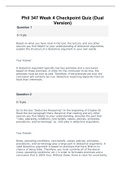Phil 347 week 4 - Study guides, Class notes & Summaries
Looking for the best study guides, study notes and summaries about Phil 347 week 4? On this page you'll find 125 study documents about Phil 347 week 4.
All 125 results
Sort by
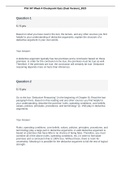
-
Phil 347 Week 4 Checkpoint Quiz (Dual Version)_2023
- Exam (elaborations) • 10 pages • 2023
-
- $8.72
- 1x sold
- + learn more
Question 1 5 / 5 pts Based on what you have read in the text, the lecture, and any other sources you find helpful to your understanding of deductive arguments, explain the structure of a deductive argument in your own words. Your Answer: A deductive argument typically has two premises and a conclusion based on those premises. In order for the conclusion to be true, the premises must be true as well. Therefore, if the premises are true, the conclusion will certainly be true. Deductive re...
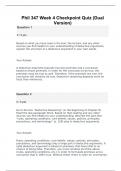
-
Phil 347 Week 4 Checkpoint Quiz (Dual Version)
- Exam (elaborations) • 12 pages • 2024
-
- $9.98
- + learn more
Phil 347 Week 4 Checkpoint Quiz (Dual Version) Based on what you have read in the text, the lecture, and any other sources you find helpful to your understanding of deductive arguments, explain the structure of a deductive argument in your own words. Your Answer: A deductive argument typically has two premises and a conclusion based on those premises. In order for the conclusion to be true, the premises must be true as well. Therefore, if the premises are true, the conclusion will ...
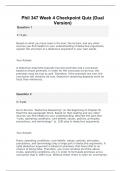
-
Phil 347 Week 4 Checkpoint Quiz (Dual Version)
- Exam (elaborations) • 12 pages • 2024
-
- $11.79
- + learn more
Phil 347 Week 4 Checkpoint Quiz (Dual Version) Based on what you have read in the text, the lecture, and any other sources you find helpful to your understanding of deductive arguments, explain the structure of a deductive argument in your own words. Your Answer: A deductive argument typically has two premises and a conclusion based on those premises. In order for the conclusion to be true, the premises must be true as well. Therefore, if the premises are true, the conclusion will ...
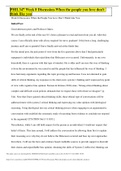
-
PHIL 347 Package Deal Critical Reasoning
- Package deal • 23 items • 2023
-
- $40.49
- 1x sold
- + learn more
PHIL 347 Week 1 Assignment: Journal PHIL-347 Week 1 Course Project: Topic Selection PHIL 347 Week 2 Assignment: Journal PHIL-347 Week 3 Course Project: Issue Review PHIL 347 Week 4 Assignment: Journal PHIL-347 Week 5 Assignment: Journal PHIL 347 Week 5 Course Project: Annotated Bibliography and Source Evaluation PHIL-347 Week 6 Checkpoint Qu
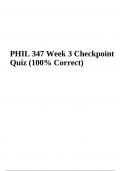
-
PHIL 347 Week 3 Checkpoint Quiz (100% Correct)
- Exam (elaborations) • 5 pages • 2023
- Available in package deal
-
- $15.49
- 1x sold
- + learn more
PHIL 347 Week 3 Checkpoint Quiz (100% Correct). According to the text, how do the views of stronger, more developed critical thinkers toward authority differ from those in earlier stages of cognitive development? (pg. 116 - 117) Our text explains that folks in the earlier stages of cognitive development view authority as someone who is powerful and capable of controlling others' behavior, or as someone trustworthy, who can offer good advice (Facione & Gittens, 2016). For example, parents a...
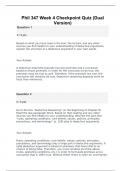
-
Phil 347 Week 4 Checkpoint Quiz (Dual Version)
- Exam (elaborations) • 12 pages • 2024
-
- $12.49
- + learn more
Phil 347 Week 4 Checkpoint Quiz (Dual Version) Based on what you have read in the text, the lecture, and any other sources you find helpful to your understanding of deductive arguments, explain the structure of a deductive argument in your own words. Your Answer: A deductive argument typically has two premises and a conclusion based on those premises. In order for the conclusion to be true, the premises must be true as well. Therefore, if the premises are true, the conclusion will ...
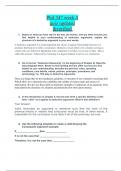
-
Phil 347 week 4 quiz updated &verified
- Exam (elaborations) • 7 pages • 2023
-
- $7.99
- + learn more
1. Based on what you have read in the text, the lecture, and any other sources you find helpful to your understanding of deductive arguments, explain the structure of a deductive argument in your own words. A deductive argument is a sound argument that shows a logical relationship between two premises that lead to or infer a conclusion. Deductive reason allows for certainty as long as certain rules are followed. Beginning with a statement we believe to be true or false. This is called the premi...
Phil 347 Week 4 Checkpoint Quiz (Dual Version)
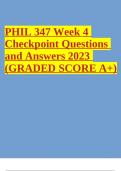
-
PHIL 347 Week 4 Checkpoint Questions and Answers 2023 (GRADED SCORE A+)
- Exam (elaborations) • 11 pages • 2023
-
- $10.99
- + learn more
PHIL 347 Week 4 Checkpoint Questions and Answers 2023 (GRADED SCORE A+) Question 1 5 / 5 pts Based on what you have read in the text, the lecture, and any other sources you find helpful to your understanding of deductive arguments, explain the structure of a deductive argument in your own words. Your Answer: A deductive argument typically has two premises and a conclusion based on those premises. In order for the conclusion to be true, the premises must be true as well. Therefore, if...
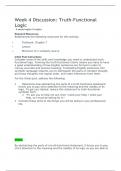
-
PHIL 347 Week 4 Discussion; Truth-Functional Logic
- Other • 2 pages • 2023
- Available in package deal
-
- $11.49
- + learn more
PHIL 347 Week 4 Discussion; Truth-Functional Logic

That summary you just bought made someone very happy. Also get paid weekly? Sell your study resources on Stuvia! Discover all about earning on Stuvia



